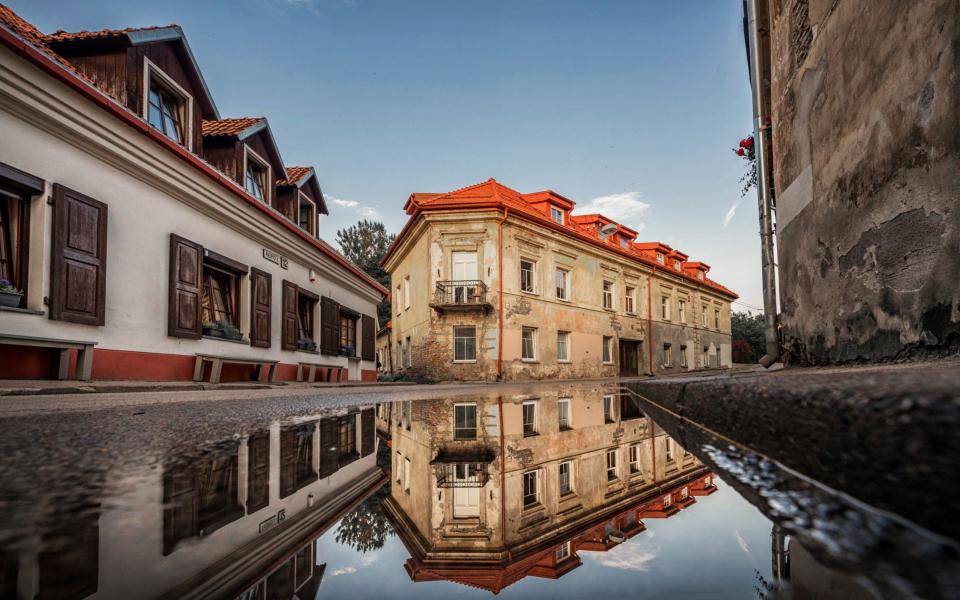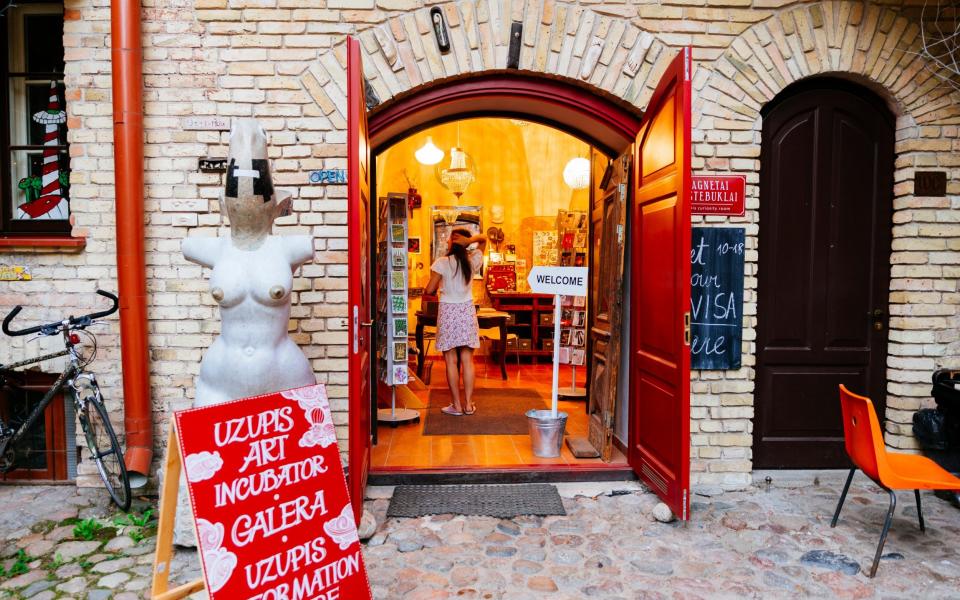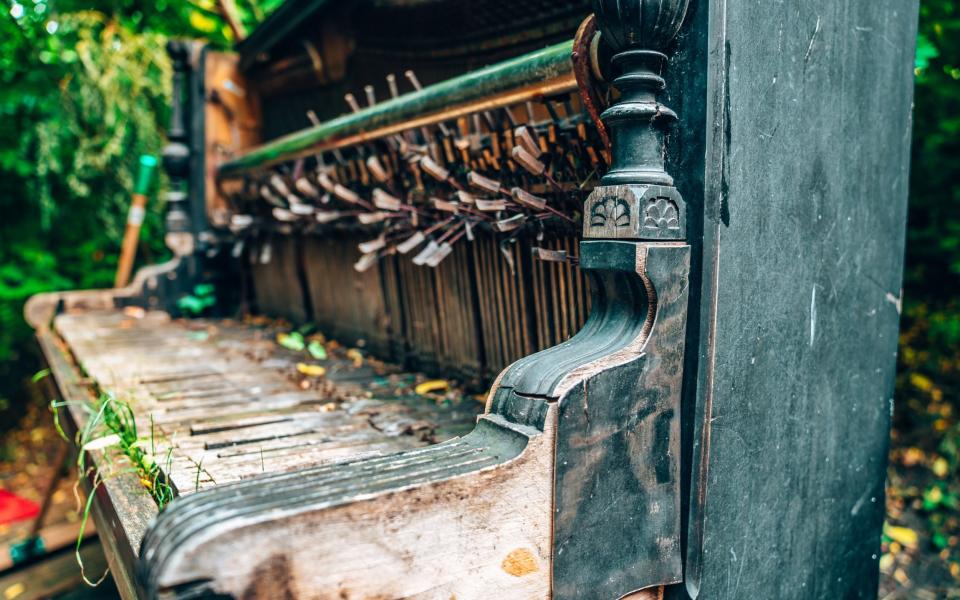Introducing Ukraine’s tiniest ally – a bohemian microstate with a curious constitution

Lithe as a pixie in a bright red beanie, Vilija Dovydėnaitė, the only official guide in her quirky microstate, skipped ahead of me across the fast-flowing Vilnele River. “Welcome to the Republic of Užupis,” she declared as we crossed the bridge. “Uzupis means ‘over the river’.”
Beyond the Vilnele, in the heart of the Lithuanian capital of Vilnius, lurks a one square kilometre enclave with its own currency – the Euro Uža, pegged to the price of a pint of beer, its own president, constitution and national flag (four, actually – one for each season), and even a 12-man army ruled by three quixotic orders: “Do not defeat others. Do not fight back. Do not surrender”. I visited earlier this month to hear more about its bohemian ideals – and to find out how it has become Ukraine’s most diminutive ally in the war against Russia.
It was a local photographer, Saulius Paukstys, who came up with the idea for Užupis in the early Nineties. He hit on the curious idea of replacing the Lenin statues torn down at the end of the Soviet era with likenesses of Frank Zappa. Pushing the absurd to its limit, Paukstys – along with current president, filmmaker Roman Lileikis – declared The Republic of Uzupis, with Zappa as patron saint, on April Fool’s Day, 1997. “It was completely crazy to do this – not only because it was just seven years after Lithuania itself had declared independence from the Soviet regime, but also because Zappa had never even visited Lithuania,” Dovydėnaitė said. “I suppose it was as good a way as any to test our new-found democracy and freedom.”

Their chosen district – Užupis – was once home to a thriving Jewish population, but most were killed during the Holocaust and after the Second World War it became derelict, dirty and dangerous. “When Lithuania declared independence, life was already tough. Russia cut off our electricity and heating – we had to start again from scratch,” Dovydėnaitė explained. “Life was especially difficult for artists and writers, and this is why all of the creative people moved to Uzupis – for the cheap rent and to find a new way to live together after Soviet times when tolerance and respect for others didn’t exist.”
These days the cobbled streets are lined with designer boutiques, trendy cafes and studios, including the Užupis Art Incubator, an experimental hotbed for visiting artists which is the first of its kind in the Baltic States.

As we strolled through the narrow alleys Dovydėnaitė pointed out several hidden courtyards. These dingy arcades, once frequented by cutthroats and prostitutes, are now home to street art: rounding one corner we came across a collection of black-and-white TVs embedded in the walls of an outdoor toilet; ducking beneath another low arch we discovered a large collection of moth-eaten teddy bears; other spaces were crammed with colourful sculptures or repurposed as cramped wine bars and cosy beer kellers.
Inevitably the distinct hip ambiance and offbeat fame – which has invited comparisons with Montmartre in Paris and Copenhagen’s Christiania – has caused a steep rise in the price of housing. “It’s ironic – this is now one of the most expensive parts of the city. No aspiring artists could afford to buy here now,” Dovydėnaitė muttered.

Emerging onto the republic’s paved main street – once known as “the Street of Death” due to the high murder rate – we passed the main square overlooked by the statue of Archangel Gabriel which gave Užupis its nickname: Republic of Angels. Further on we came to a long brick wall covered in shiny metal signs. They display the microstate’s constitution, Dovydėnaitė told me. Translated into more than 50 different languages, it consists of more than 40 articles. They include “Cats have the right to not love their owners” and “Everyone has the right to be in doubt but this is not an obligation.”

Dovydėnaitė explained: “It’s written in a funny way but if you put it in the right context it has a lot of meaning. Like the Republic itself, this is all about people relearning to think for themselves and express themselves freely after 70 years of oppression – you could say this is the first written document of human rights in post-Soviet Lithuania.”
Since Russia’s invasion of Ukraine, many of the republic’s inhabitants have been involved in organising city-wide protests and initiatives to demonstrate solidarity with Ukraine. In Uzupio Kavine, a local pub which doubles as the republic’s presidential office, I met Neringa Rekašiūtė, an artist whose recent work includes a powerful anti-war video showing a woman swimming through a blood-red lake. “I used the pond outside the Russian Embassy – we dyed it red and then Olympic swimmer Rūta Meilutytė swam across,” she explained. “I wanted to show that the Russians have blood on their hands. But I also wanted to show hope – to show Ukrainians swimming through all this blood, but towards freedom.”
Lifting her glass of bitter local liqueur Trejos Devynerios for a toast, she added: “Here in Uzupis – and in Lithuania – we feel a strong sense of empathy with what’s happening in Ukraine. After all, we were once the same country – this could be happening to us.”
How to do it
Fly from London Gatwick to Vilnius, from £78 return, with Ryanair (ryanair.com). Eat at Queensberry (mains from €7; m.facebook.com/queensberryrestaurant). Stay at The Artagonist (artagonist.lt), with doubles from £68 a night.

 Yahoo News
Yahoo News 
